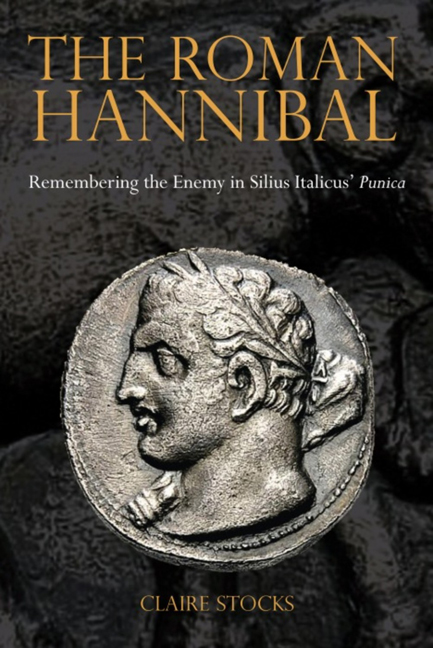Book contents
- Frontmatter
- Contents
- Acknowledgements
- Texts and Translations Used
- Introduction: Silius Italicus and the Roman Hannibal
- Chapter One The Roman Hannibal Defined
- Chapter Two Before Silius: The Creation of the Roman Hannibal
- Chapter Three Silius' Influences
- Chapter Four Epic Models
- Chapter Five Silius' Roman Hannibal
- Chapter Six Out of the Darkness and into the Light
- Chapter Seven Hannibal's Decline after Cannae: Separating Man from Myth
- Chapter Eight Imitators and Innovators
- Chapter Nine Band of Brothers
- Chapter Ten The ‘Lightning Bolts’ (Fulmina) of War
- Chapter Eleven The Man and his Myth: The Self-Defined Roman Hannibal
- Conclusion: The Crossing of the Worlds: The Move from Internal to External Narrative
- Bibliography
- General Index
- Index locorum
Chapter One - The Roman Hannibal Defined
- Frontmatter
- Contents
- Acknowledgements
- Texts and Translations Used
- Introduction: Silius Italicus and the Roman Hannibal
- Chapter One The Roman Hannibal Defined
- Chapter Two Before Silius: The Creation of the Roman Hannibal
- Chapter Three Silius' Influences
- Chapter Four Epic Models
- Chapter Five Silius' Roman Hannibal
- Chapter Six Out of the Darkness and into the Light
- Chapter Seven Hannibal's Decline after Cannae: Separating Man from Myth
- Chapter Eight Imitators and Innovators
- Chapter Nine Band of Brothers
- Chapter Ten The ‘Lightning Bolts’ (Fulmina) of War
- Chapter Eleven The Man and his Myth: The Self-Defined Roman Hannibal
- Conclusion: The Crossing of the Worlds: The Move from Internal to External Narrative
- Bibliography
- General Index
- Index locorum
Summary
The power of the name
‘Carthage: Home of military superstar Hannibal …’
Tunisia, Lonely Planet Guides (2004, 3rd edn.)The name holds the power. Think of Hannibal and the mind conjures images of superhuman military feats and of a Roman nation terrified but still ultimately victorious. It is the memories, rumours, stories, and texts that have created such images, but it is the name, the nomen, that acts as the trigger.
The power of the name to evoke emotion and epitomise identity is evident throughout classical literature. We see it in Sallust's ruthless Catiline, who is given a name associated with cruelty (e.g. Catilinae crudelis animus, ‘the cruel mind of Catiline’, or even ‘the mind of cruel Catiline’, Cat.31.2), and in the potency of Lucan's Caesar, whose identity is symbolised yet not limited by his name: sed non in Caesare tantum nomen erat nec fama ducis (‘but Caesar did not only have the name and reputation of a leader’, B.C.1.143–4). Livy, too, uses the names of his characters to form part of his discourse on identity. The consul Nero, for example, becomes the onomastic lasso to rein in Livy's Hannibal: nomen Neronis satis fuisse ad continendum castris Hannibalem (‘the name of Nero was enough to contain Hannibal within his camp’, 28.9.14).
The nomen, then, epitomises an individual's identity, allowing it to function as more than the signpost for the physical appearance of a character in a scene. As such, it can be employed to represent an individual in the abstract sense – that is, in terms of the characteristics that define him or her. Thus there are many instances where we can see ancient authors employing a potent name for rhetorical effect. Cicero, for example, when condemning Verres for his actions in Sicily (Verr.5.31), calls him iste Hannibal (‘that Hannibal’), playing upon the Carthaginian's established reputation for avarice and cruelty, and so instantly styling Verres in his greed as both an enemy against Rome and the Hannibal of his generation. So, too, Velleius Paterculus in his assessment of Mithridates calls him ‘a Hannibal’ in his hatred for the Romans (odio in Romanos Hannibal, 2.18.1). Cicero and Vellius Paterculus’ audiences are expected to get the joke: to already know what it means to be ‘Hannibal’, and hence to understand the repercussions of being compared to him.
- Type
- Chapter
- Information
- The Roman HannibalRemembering the Enemy in Silius Italicus’ Punica, pp. 6 - 12Publisher: Liverpool University PressPrint publication year: 2014



